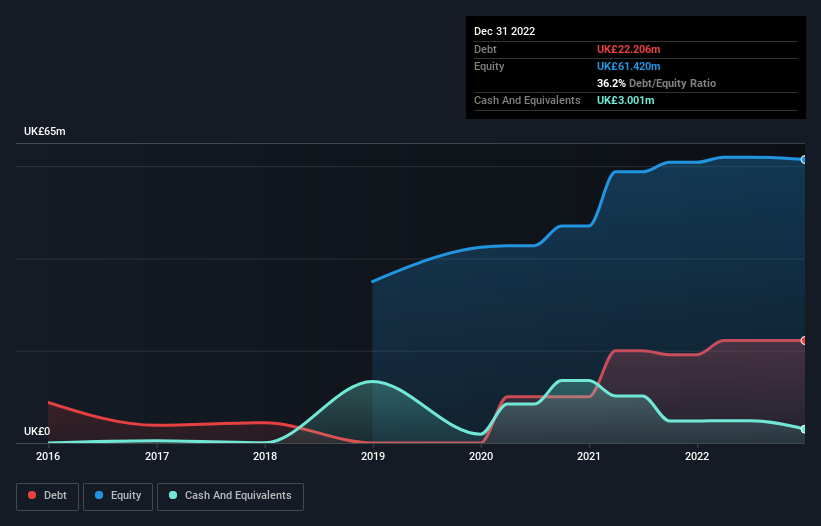- United Kingdom
- /
- Professional Services
- /
- AIM:RBGP
RBG Holdings (LON:RBGP) Takes On Some Risk With Its Use Of Debt

Some say volatility, rather than debt, is the best way to think about risk as an investor, but Warren Buffett famously said that 'Volatility is far from synonymous with risk.' It's only natural to consider a company's balance sheet when you examine how risky it is, since debt is often involved when a business collapses. Importantly, RBG Holdings plc (LON:RBGP) does carry debt. But the more important question is: how much risk is that debt creating?
When Is Debt A Problem?
Generally speaking, debt only becomes a real problem when a company can't easily pay it off, either by raising capital or with its own cash flow. In the worst case scenario, a company can go bankrupt if it cannot pay its creditors. However, a more usual (but still expensive) situation is where a company must dilute shareholders at a cheap share price simply to get debt under control. Having said that, the most common situation is where a company manages its debt reasonably well - and to its own advantage. When we examine debt levels, we first consider both cash and debt levels, together.
Check out our latest analysis for RBG Holdings
What Is RBG Holdings's Net Debt?
The image below, which you can click on for greater detail, shows that at December 2022 RBG Holdings had debt of UK£22.2m, up from UK£19.1m in one year. However, because it has a cash reserve of UK£3.00m, its net debt is less, at about UK£19.2m.

How Strong Is RBG Holdings' Balance Sheet?
According to the last reported balance sheet, RBG Holdings had liabilities of UK£22.2m due within 12 months, and liabilities of UK£34.6m due beyond 12 months. On the other hand, it had cash of UK£3.00m and UK£25.0m worth of receivables due within a year. So its liabilities outweigh the sum of its cash and (near-term) receivables by UK£28.7m.
This deficit is considerable relative to its market capitalization of UK£32.2m, so it does suggest shareholders should keep an eye on RBG Holdings' use of debt. This suggests shareholders would be heavily diluted if the company needed to shore up its balance sheet in a hurry.
We measure a company's debt load relative to its earnings power by looking at its net debt divided by its earnings before interest, tax, depreciation, and amortization (EBITDA) and by calculating how easily its earnings before interest and tax (EBIT) cover its interest expense (interest cover). This way, we consider both the absolute quantum of the debt, as well as the interest rates paid on it.
RBG Holdings's net debt of 1.5 times EBITDA suggests graceful use of debt. And the alluring interest cover (EBIT of 8.3 times interest expense) certainly does not do anything to dispel this impression. Fortunately, RBG Holdings grew its EBIT by 2.2% in the last year, making that debt load look even more manageable. There's no doubt that we learn most about debt from the balance sheet. But ultimately the future profitability of the business will decide if RBG Holdings can strengthen its balance sheet over time. So if you want to see what the professionals think, you might find this free report on analyst profit forecasts to be interesting.
Finally, while the tax-man may adore accounting profits, lenders only accept cold hard cash. So it's worth checking how much of that EBIT is backed by free cash flow. Over the most recent three years, RBG Holdings recorded free cash flow worth 58% of its EBIT, which is around normal, given free cash flow excludes interest and tax. This cold hard cash means it can reduce its debt when it wants to.
Our View
Even if we have reservations about how easily RBG Holdings is capable of staying on top of its total liabilities, its interest cover and conversion of EBIT to free cash flow make us think feel relatively unconcerned. Looking at all the angles mentioned above, it does seem to us that RBG Holdings is a somewhat risky investment as a result of its debt. Not all risk is bad, as it can boost share price returns if it pays off, but this debt risk is worth keeping in mind. The balance sheet is clearly the area to focus on when you are analysing debt. However, not all investment risk resides within the balance sheet - far from it. Be aware that RBG Holdings is showing 3 warning signs in our investment analysis , you should know about...
If, after all that, you're more interested in a fast growing company with a rock-solid balance sheet, then check out our list of net cash growth stocks without delay.
New: AI Stock Screener & Alerts
Our new AI Stock Screener scans the market every day to uncover opportunities.
• Dividend Powerhouses (3%+ Yield)
• Undervalued Small Caps with Insider Buying
• High growth Tech and AI Companies
Or build your own from over 50 metrics.
Have feedback on this article? Concerned about the content? Get in touch with us directly. Alternatively, email editorial-team (at) simplywallst.com.
This article by Simply Wall St is general in nature. We provide commentary based on historical data and analyst forecasts only using an unbiased methodology and our articles are not intended to be financial advice. It does not constitute a recommendation to buy or sell any stock, and does not take account of your objectives, or your financial situation. We aim to bring you long-term focused analysis driven by fundamental data. Note that our analysis may not factor in the latest price-sensitive company announcements or qualitative material. Simply Wall St has no position in any stocks mentioned.
About AIM:RBGP
RBG Holdings
Provides legal and professional services to companies, banks, entrepreneurs, and individuals in the United Kingdom, Europe, North America, and internationally.
Undervalued moderate.
Market Insights
Community Narratives




